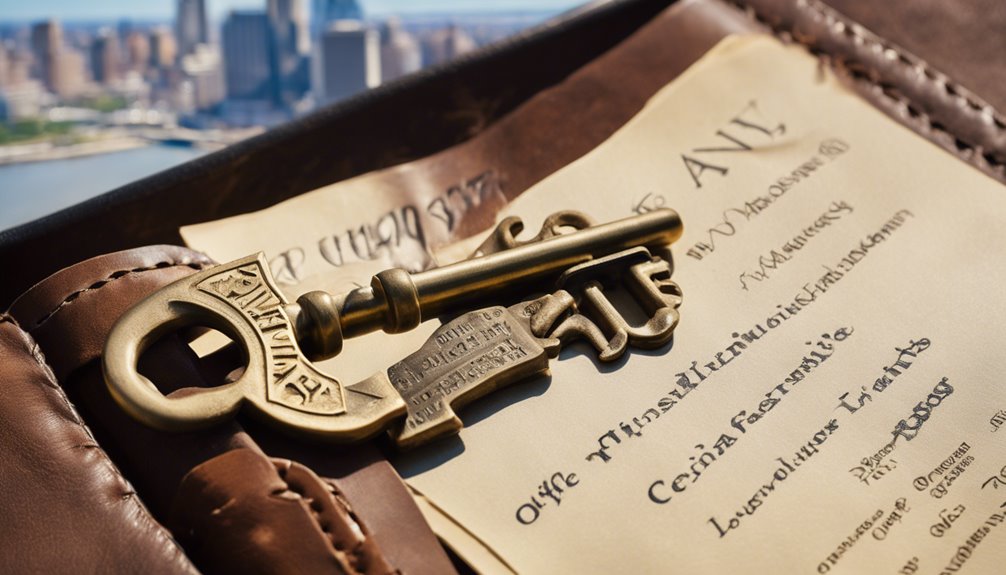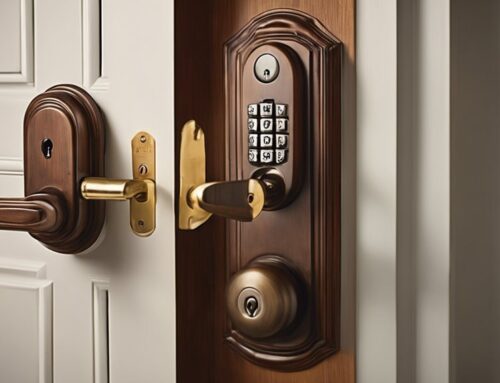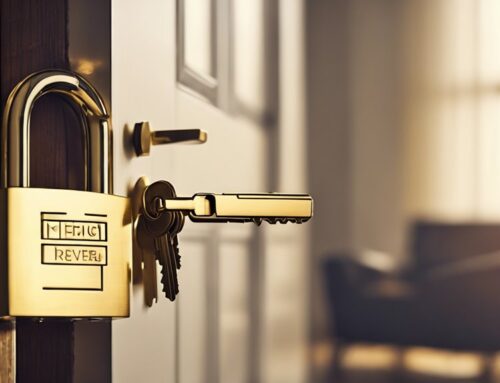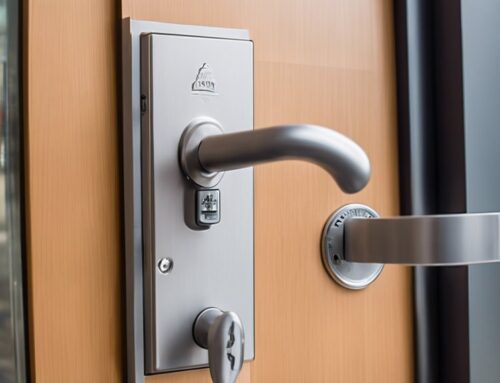If you're considering a career as a locksmith in New Jersey, you need to understand the licensing requirements that come with it. You'll find that meeting eligibility criteria, educational standards, and certain practical experiences are essential for your application process. But what happens if you don't fulfill every requirement, or how do you navigate the complexities of maintaining your license? The details can be intricate, and the right approach can make all the difference in your journey toward becoming a licensed locksmith.
Key Takeaways
- Applicants must be at least 18 years old with a high school diploma or equivalent.
- A minimum of 5,040 hours of practical locksmithing experience or completion of a two-year approved apprenticeship is required.
- A comprehensive examination covering NJ Uniform Construction Code and locksmithing practices must be passed for licensing.
- Licensed locksmiths must maintain general liability insurance of at least $500,000 and a $10,000 surety bond.
- Licenses need to be renewed every three years with a $120.00 fee and adherence to continuing education requirements.
Eligibility Requirements

To become a licensed locksmith in New Jersey, you must meet several eligibility requirements that guarantee you're qualified for the profession.
First and foremost, you need to be at least 18 years old and hold a high school diploma or an equivalency certificate. Demonstrating good moral character is essential; state regulations stipulate that you mustn't have any convictions for a first, second, or third-degree crime within the past ten years. Additionally, you should have a thorough understanding of key duplication laws which governs practices related to the profession. Furthermore, being aware of lock change laws ensures that you respect tenants' rights and comply with state regulations.
Additionally, if you've been convicted of engaging in unlicensed practice of electrical contracting, that must also be outside of the ten-year timeframe.
A criminal history background check is a critical part of the process, so you'll need to submit your fingerprints for screening. This confirms that you uphold the standards of integrity expected in the field.
You must comply with all New Jersey laws and regulations governing locksmithing services, including maintaining adherence to the New Jersey Uniform Construction Code and the Americans with Disabilities Act Code.
To finalize your eligibility, you'll file your application through the Fire Alarm, Burglar Alarm, and Locksmith Advisory Committee and pay a non-refundable application fee of $150.
Make sure to include proof of your experience or apprenticeship as part of your documentation. Once approved, your license will be valid for three years, and it's your responsibility to maintain it active and in good standing.
Educational and Training Requirements

Understanding the educational and training requirements for becoming a licensed locksmith in New Jersey is essential for aspiring professionals. To qualify, you must accumulate at least three years of practical hands-on experience in locksmithing services, working full-time for a total of 5,040 hours. This experience must focus solely on providing locksmith services, as managerial tasks, engineering, or estimating won't count. Additionally, it's crucial that you are familiar with New Jersey's lock picking laws, as this knowledge is vital for legal compliance in locksmithing. Furthermore, you should also have a clear understanding of lock rekeying laws applicable in the state, as these can affect your operational practices.
Alternatively, if you complete a two-year apprenticeship program approved by the Bureau of Apprenticeship and Training, you can fulfill the experience requirement. These programs combine on-the-job training with classroom instruction, offering invaluable hands-on experience and specialized knowledge under the guidance of seasoned locksmiths.
In addition to experience or apprenticeship, you're required to complete specific training courses. This includes two hours each in the Barrier Free Subcode, New Jersey Uniform Construction Code, Americans with Disabilities Act Code, industrial safety, and state laws governing burglar alarm, fire alarm, and locksmithing services. Furthermore, you must complete 24 hours of coursework for the renewal of your locksmith license, ensuring you stay updated on industry standards.
Together, these courses guarantee you understand the legal and safety frameworks that govern your work.
Examination Requirements

To become a licensed locksmith in New Jersey, you'll need to pass a thorough examination. This test covers essential topics like the NJ Uniform Construction Code and industry practices specific to locksmithing. Understanding the registration process is vital, as it involves obtaining preliminary approval and completing a background check before you can sit for the exam. Additionally, completing an 18 credit hours training course is crucial to adequately prepare for the necessary examinations. It's also important to be aware of employment laws that govern workplace safety and rights for locksmiths in New Jersey. Furthermore, understanding the high-security lock standards in New Jersey is essential for effective locksmith services.
Examination Content Overview
While preparing for the locksmith examination in New Jersey, you'll encounter a thorough assessment that covers multiple aspects of locksmithing services. This examination tests your knowledge in various areas, including locksmithing techniques and tools, as well as essential safety protocols.
You'll also need to be familiar with New Jersey laws and regulations that govern locksmithing services. Important topics include the New Jersey Uniform Construction Code and Barrier Free Subcode, guaranteeing you understand the legal framework that supports your profession. Compliance with lock safety standards is vital, as it ensures the security and reliability of the locking mechanisms you install and service.
Additionally, the examination encompasses the Americans with Disabilities Act Code and fundamental industrial safety standards. Understanding how to ensure ADA compliance for locks is crucial for your role, as it impacts accessibility for individuals with disabilities.
To guarantee extensive readiness, you'll benefit from two hours of training in specific areas such as the Barrier Free Subcode, the New Jersey Uniform Construction Code, and the Americans with Disabilities Act Code.
Furthermore, another two hours focusing on industrial safety and legal rules governing locksmithing will be essential.
Registration Process Details
Before you can register for the locksmith examination in New Jersey, certain requirements must be met. First, you need to be at least 18 years old and possess a high school diploma or equivalent. Additionally, make certain you haven't been convicted of a crime of the first, second, or third degree within the last ten years, as you must demonstrate good moral character. This is crucial, as those engaging in activities such as eviction procedures must operate within legal boundaries.
You'll also need practical experience in locksmithing. This means you should have at least three years of hands-on experience, with a minimum of 5,040 hours worked full-time. Alternatively, completing a two-year approved apprenticeship can satisfy this requirement. Confirm your experience is certified by an employer or business owner in the field.
Furthermore, the examination process requires you to complete specific training. You'll need eight hours focusing on topics including Barrier-Free Subcode, the New Jersey Uniform Construction Code, and safety regulations. Additionally, understanding locksmith licensing requirements is crucial for ensuring compliance with state regulations.
Finally, when you're ready to apply, submit your application online or by mail, pay the non-refundable fee of $150, and attach a signed photograph and notarized affidavit. Meeting these criteria will help you successfully register for the locksmith examination.
Application Process

When you're ready to apply for a locksmith license in New Jersey, you'll need to complete specific application form requirements.
This includes paying the necessary fees and ensuring your application is notarized.
Each step is essential for a smooth application process.
Application Form Requirements
Applying for a locksmith license in New Jersey requires careful attention to specific application form requirements. To guarantee your application is accepted, you must include the following key components:
1. Personal Information: You must be at least 18 years old and possess a high school diploma or equivalency certificate. Additionally, fully answer all questions regarding your criminal history and child support status, ensuring no serious convictions in the past 10 years.
2. Practical Experience: Provide proof of at least three years (5,040 hours) of hands-on locksmithing experience or a completed two-year apprenticeship program.
If you're a business owner, include two certification forms from fellow business owners to verify your experience. Employees must secure one form from their employer.
3. Documentation: Attach a signed and dated 2×2-inch full-face photograph on the back, along with the notarized Affidavit section.
Submit your fingerprints for the criminal history background check, and make sure the application is complete to avoid delays.
Payment of Fees
Steering the payment of fees is an important step in securing your locksmith license in New Jersey. For individual applicants, you'll need to submit a non-refundable application fee of $150. This payment must be made via check or money order, directed to the State of New Jersey, and submitted alongside your application form.
Keep in mind that if your application is rejected, the fee won't be refunded.
If you're applying for a business license, be prepared for a more substantial initial fee of $500, specifically for locksmith businesses. This fee is essential as it supports your business's licensing process, and additional costs may arise depending on the type of licenses you require.
For individual licenses, renewals occur every three years, though the renewal fee usually remains lower than the initial application fee. Make sure you pay this before your license expires to avoid late fees.
Lastly, as part of your licensing journey, you're required to obtain general liability insurance of $500,000 and an additional surety bond of $10,000. This coverage is important in safeguarding your business against potential risks.
Notarization Process Needed
The notarization process is essential for completing your locksmith license application in New Jersey, as it guarantees the legitimacy of your submitted documents.
Failing to notarize the necessary affidavit could delay or even deny your application.
Here's what you need to do to verify everything's in order:
- Locate a Notary Public: Find a notary public authorized to notarize documents in New Jersey. Verify their credentials to avoid any issues.
- Witness Signing: Sign your affidavit and other required documents in the presence of the notary public. This verifies your signature is valid and witnessed appropriately.
- Submit Notarized Documents: Make sure to attach the notarized affidavit along with the fully completed application form.
Double-check that you've added all necessary supporting documents before submitting them to the Fire Alarm, Burglar Alarm, and Locksmith Advisory Committee at 124 Halsey Street, 6th Floor, Newark, NJ 07101.
Business Licensing Requirements

To operate a locksmith business in New Jersey, you must meet specific licensing requirements set by state regulations. First, your business application needs a designated licensee, who's the individual locksmith license holder serving as your Business Qualifier. This Qualifier must submit an affidavit along with your license application.
Here's a concise overview of key business licensing requirements:
| Requirement | Description |
|---|---|
| General Liability Insurance | Maintain coverage of $500,000 |
| Surety Bond | Obtain $10,000 payable to the State of New Jersey |
| Employee Information | Provide names and duties of your employees |
| Background Checks | All employees must undergo criminal history reviews |
Additionally, confirm your business is registered, acquire an Employer Identification Number (EIN), and register for New Jersey tax and employer purposes. You'll need to adhere to state laws regarding unlawful conduct and maintain professional standards throughout your operations.
While the Business Qualifier must hold a valid individual locksmith license, verify you submit the non-refundable license application fee along with any required supporting information. Remember, you'll be responsible for your employees' conduct, so compliance is essential. This thorough understanding of business licensing will facilitate a smooth startup for your locksmith services while allowing you the freedom to operate effectively in New Jersey's competitive landscape.
License Renewal Process

Knowing when and how to renew your locksmith license is essential for maintaining your business's legitimacy in New Jersey. To guarantee a smooth renewal process, keep the following steps in mind:
- Pay Attention to Renewal Notices: You'll receive a renewal notice at least 60 days before your license expires. If you don't receive this notice, you can still renew without penalties, provided you apply within 60 days of receiving the notice or 30 days after expiration.
- Submit Your Application on Time: You must send your renewal application and the required fee of $120.00 before your current license expires. If you miss the deadline, you have a grace period of 30 days during which you can still renew, but a late fee of $50.00 will apply.
- Understand the Consequences of Non-Renewal: If you fail to submit your renewal application within 30 days of expiration, your license will be suspended automatically. You can't practice locksmith services during this suspension, and restoring your license might involve additional training or education requirements.
Maintenance of License
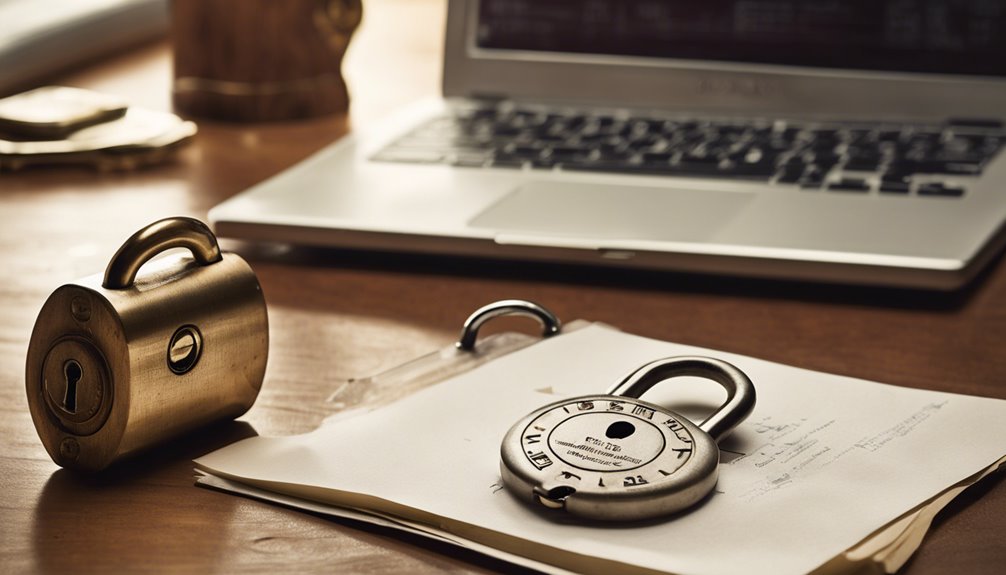
Maintaining your locksmith license in New Jersey goes beyond just the renewal process. Your license is valid for three years, and you'll receive a renewal notice at least 60 days before it expires. To keep your license active, you need to submit your renewal application and fee before the expiration date.
If you miss this deadline, there's a grace period of 30 days for late renewal, but be aware that an additional fee applies. Failing to renew within this timeframe will result in license suspension.
In addition to timely renewal, continuing education is vital. You must complete specific educational courses focusing on safety, codes, and the latest industry updates to stay current.
Remember, if your license goes inactive, you'll need to fulfill the required credits to regain active status.
You also need to maintain a surety bond of at least $10,000 throughout the duration of your license. This bond demonstrates your financial responsibility and adherence to regulations.
Letting your bond lapse can lead to license suspension or even revocation.
Lastly, guarantee compliance with employee and business requirements. You must report new hires to the Board within 30 days, guarantee employees undergo a criminal background review, and that they possess photo identification cards.
Each business also requires its own locksmith license. By diligently adhering to these requirements, you safeguard your business and maintain your professional standing in the industry.
Background Checks
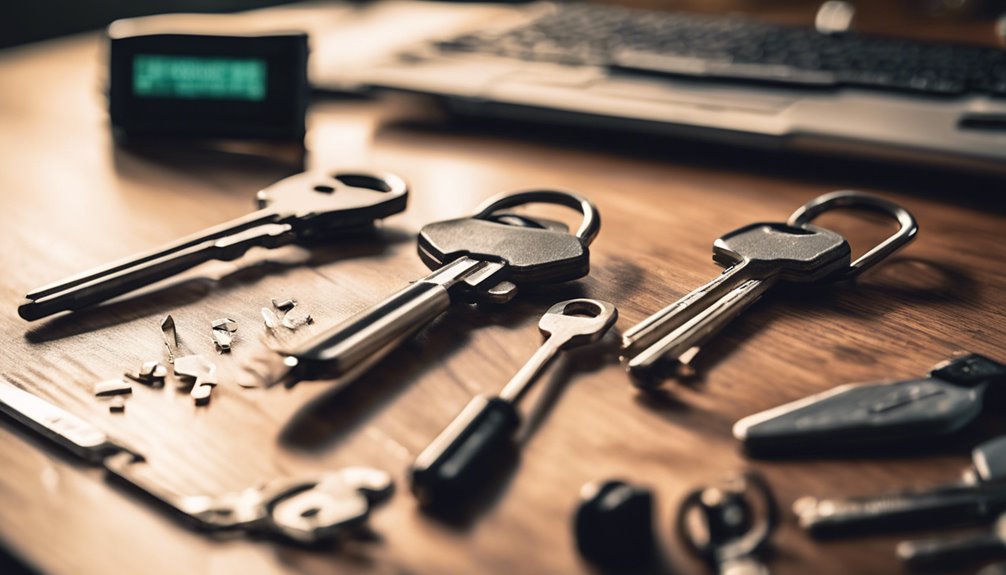
While maneuvering through the licensing process, it's crucial to understand the background check requirements for locksmiths in New Jersey. These checks are in place to guarantee safety, trust, and integrity in the locksmith industry.
You'll need to undergo a criminal history background check, which involves submitting your fingerprints at designated locations. The check will look into any convictions or pending data from the last 10 years.
Here are the key points to remember about background checks:
- Eligibility Criteria: You mustn't have been convicted of any serious crimes, such as first, second, or third-degree offenses, within the past ten years. Good moral character is a must.
- Fingerprint Submission: Your fingerprints will be collected electronically at approved fingerprinting sites using specific contributor case numbers for noncriminal licensing checks.
- Results Notification: Once the check is processed, the results are sent to you or your employer. If you have no criminal history, a letter confirming this will be available for download on the NJSP website.
Understanding and complying with these requirements isn't just about securing your license; it's vital for protecting the public.
Failing to meet the background check criteria can lead to denial or revocation of your license, undermining the trust vital in this profession.
Prioritize compliance to guarantee your pathway to becoming a licensed locksmith is smooth and straightforward.
Insurance Requirements

Once you've navigated the background check requirements, securing proper insurance is the next step in obtaining your locksmith license in New Jersey.
You'll need to have general liability insurance with a minimum coverage amount of $500,000. This protects not only your business but also third parties from potential bodily injury or property damage caused by your services, ensuring you're prepared for defense costs and compensatory damages.
Additionally, you must obtain a surety bond of $10,000, payable to the State of New Jersey. This bond guarantees your commitment to faithfully adhere to the provisions of the locksmithing Act and related rules, and it must be executed by a recognized surety company in New Jersey.
To comply with licensing regulations, your business must maintain this insurance throughout the term of your license.
Remember, marking your service vehicles and providing a 24-hour emergency service number are also essential for compliance.
The cost of insurance can vary based on factors such as your business location, crew size, and coverage limits.
Fortunately, flexibility is available; you can explore various payment options, including hourly or monthly installments.
Plus, obtaining quotes for insurance is usually quick and free, giving you the freedom to choose the policy that best fits your business needs.
With the right insurance in place, you're one step closer to confidently operating as a licensed locksmith in New Jersey.
Frequently Asked Questions
Can I Apply for a Locksmith License Online?
Yes, you can apply for a locksmith license online.
The New Jersey Division of Consumer Affairs offers the MyLicense Online Licensing platform where you can submit applications for both individuals and businesses.
Just make certain you properly fill out the application, provide the necessary supporting documents, and pay the non-refundable fee.
If you prefer, you can also download the application form and submit it manually.
It's a straightforward process to start your licensing journey.
What Documents Are Needed for the Application?
Think of your application as a key opening a door to opportunity.
To complete it, you'll need several documents: a completed application form, a non-refundable $150 fee, and proof of your education, training, or apprenticeship.
Include your fingerprint submission for the criminal background check and any other supporting information requested.
Each piece is essential, as they collectively guarantee you can commence your locksmithing journey with integrity and skill.
How Long Does the Licensing Process Take?
The licensing process can vary, but you should expect it to take several weeks to a few months.
After submitting your application and necessary documents, the review and background check can take time.
Once your application is approved, you'll need to pass the locksmithing exam, which requires additional preparation.
Staying organized and proactive can help speed up the process, ensuring you've met all requirements and are ready to work as soon as possible.
Are There Continuing Education Requirements for Locksmiths?
Yes, there are continuing education requirements for locksmiths. You need to complete 24 hours of education every three years.
This includes specific topics like the New Jersey law governing locksmith services, safety regulations, and codes related to accessibility.
Make sure to choose courses approved by the New Jersey Fire Alarm, Burglar Alarm and Locksmith Advisory Committee.
Many providers offer flexible options, including online courses, to help you fulfill these requirements conveniently.
What Happens if I Fail the Locksmith Examination?
Well, failing the locksmith examination could feel like a ticket to freedom—except it's not.
You'll need to retake the failed sections, but you've got 24 months to do it, and it won't cost you extra till the second try.
After a couple of failures, though, that freedom comes with waiting periods and even forfeiting prior scores.
To truly release your potential, consider some extra preparation before the next attempt.
Conclusion
Obtaining a locksmith license in New Jersey is like crafting a master key—it requires skill, patience, and adherence to specific standards. Just as a key must fit perfectly to release a door, your preparation and compliance with licensing requirements open the pathway to a successful locksmith career. By staying informed and following the guidelines outlined, you guarantee your place in this essential trade, ready to serve your community with expertise and professionalism.

